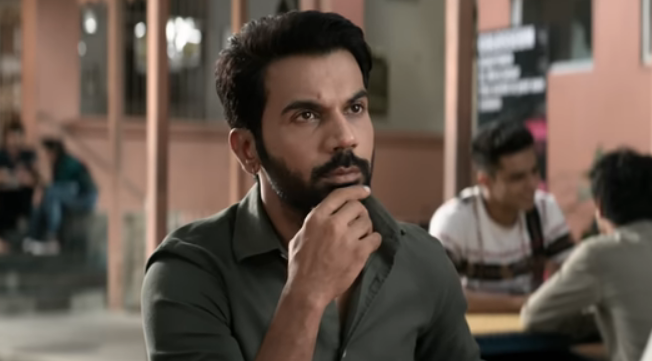As far as making thrillers are concerned, the Telugu, Tamil, Malayalam and Kannada film industries have an edge over the Hindi film industry. In the last several years, these four industries have churned out several innovative and engaging films in this space. ‘HIT: The First Case’ (Telugu/original) made it to the theatres on 28 February, 2020, right before the Covid-19 crisis resulted in a lockdown all over the world and emerged as a box-office success. After two years, its Hindi remake, with the same title and the director, releases in theatres.
Vikram Jaisingh (Rajkummar Rao) works for the Homicide Investigation Team or HIT, a wing of the police force that deals with homicide cases. Because of some of the events that occurred in his past, Vikram has been suffering from Post Traumatic Stress Disorder or PTSD. His psychiatrist is of the opinion that he should quit his job but Vikram believes that it’s the only thing that is helping him maintain his sanity to a certain extent. His girlfriend Neha (Sanya Malhotra), too, believes that being in a profession that makes him investigate serious crimes, affects his mental health even more badly.
Vikram gets into a verbal argument with Neha over this and takes a leave of three months to get clear his head. While he is on leave, Vikram is informed that Neha has gone missing. He comes back to investigate her disappearance but is told that the case has been handed over to somebody else. Meanwhile, Vikram stumbles upon the case file of an 18-year old girl named Preeti (Rose Khan) who went missing two months ago. Since Neha, as a forensic expert, was working on the case and there are certain similarities between the way in which the two women disappeared, Vikram takes the charge of Preeti’s case as he believes it will help him find Neha as well.
When you decide to remake a film, you have two options at your disposal. You either make a frame-to-frame remake or make certain modifications to the original script to make it more engaging or interesting. Here, writer-director Sailesh Kolanu tweaks the script of the original film (also written by him) but in a way that the film loses its essence to a great extent.
While watching the film, I was wondering whether the producers of this film saw the original and got Sailesh on board after making him promise them that he would cut down on the length of the film and work towards making a ‘crisper’ Hindi version. In the original film, one witnessed Vikram Rudraraju (Vishwak Sen) using his intelligence to help the police in two cases, one after another. In this film, the two sequences are, in a way, clubbed together and the second case, which was very interesting, has not been explored at all. While the version had a good pace, the writer-director worked had towards building up the tension in most of the scenes. Here, many of the scenes have been ‘compressed’ and have a hurried feel to them.
The edit structure of the two films, too, are quite different to them and one wonders what made Kolanu take this call. While the manner in which the culprit is identified/traced is quite similar to the original, Kolanu, for some reason, decided that the motive behind the crime has to be different. In the original film, the motive and the dynamics around it were not drawn out properly. However, it was still convincing. Here, it would be quite difficult for the audience to relate to the motive behind the culprit’s actions.
In the original film, Vishwak Sen managed to strike a fine balance between being a competent cop and an individual who is dealing with the demons of his past. In almost every scene, you could see these two facets of his personality. In this film, Rajkummar Rao manages to bring the vulnerability of his character to the fore only when the script requires him to do something physically. In all the other scenes, he plays the character like a super cop who can’t do any wrong.
Sanya Malhotra has a few interesting scenes in the first half but overall, she gets limited scope. Milind Gunaji does very well as SI Ibrahim. In the original film, Rohit’s (Chaitanya Sagiraju) transition from being somebody who is always at loggerheads with Vikram to helping him out was not shown properly. That has not been rectified here. So, while Jatin Goswami delivers a good performance as Akshay, you find it difficult to relate to him. Shilpa Shukla, too, suffers from a poorly written character but leaves a mark.
Even though the original script had several implausible situations, ‘HIT: The First Case’ (2020) was a very engaging thriller that kept you on the edge of your seats. The Hindi version serves as a blueprint for how one should not be remaking a taut thriller.

